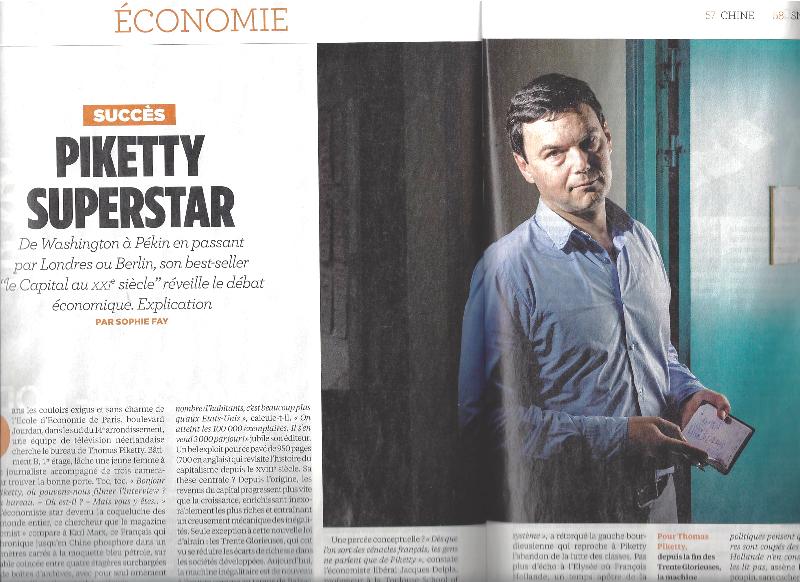|
|

Siêu sao kinh
tế học, giáo sư... THD Tẩy mũi lõ, với best-seller, "Tư bản ở thế
kỷ 21". Bài
trên tờ
Books rất được.
Tin Văn sẽ giới thiệu liền. Và cùng với nó, là câu hỏi của tờ
báo:
Liệu chủ nghĩa tư
bản sẽ giết chết dân chủ?
April 15, 2014 5:38 pm
‘Capital
in the Twenty-First Century’, by Thomas Piketty (1)
Note:
Cuốn này, đang được thổi dữ lắm. Tác giả là 1 anh Tẩy
Capital in the Twenty-First Century,
by Thomas Piketty, translated by Arthur Goldhammer, Harvard University
Press RRP£29.95/Belknap Press RRP$39.95, 696 pages
French economist Thomas Piketty has written an extraordinarily
important book. Open-minded readers will surely find themselves unable
to ignore the evidence and arguments he has brought to bear.
Capital in the Twenty-First Century contains four remarkable
achievements. First, in its scale and sweep it brings us back to the
founders of political economy. Piketty himself sees economics “as a
subdiscipline of the social sciences, alongside history, sociology,
anthropology, and political science”. The result is a work of vast
historical scope, grounded in exhaustive fact-based research, and
suffused with literary references. It is both normative and political.
Piketty rejects theorising ungrounded in data. He also insists that
social scientists “must make choices and take stands in regard to
specific institutions and policies, whether it be the social state, the
tax system, or the public debt”.
Second, the book is built on a 15-year programme of empirical research
conducted in conjunction with other scholars. Its result is a
transformation of what we know about the evolution of income and wealth
(which he calls capital) over the past three centuries in leading
high-income countries. That makes it an enthralling economic, social
and political history.
Among the lessons is that there is no general tendency towards greater
economic equality. Another is that the relatively high degree of
equality seen after the second world war was partly a result of
deliberate policy, especially progressive taxation, but even more a
result of the destruction of inherited wealth, particularly within
Europe, between 1914 and 1945. A further lesson is that we are slowly
recreating the “patrimonial capitalism” – the world dominated by
inherited wealth – of the late 19th century.
Some argue that rising human capital will reduce the economic
significance of other forms of wealth. But, notes Piketty, “ ‘nonhuman
capital’ seems almost as indispensable in the twenty-first century as
it was in the eighteenth or nineteenth”. Others argue that “class
warfare” will give way to “generational warfare”. But inequality within
generations remains vastly greater than among them. Yet others suggest
that intragenerational mobility robs rising inequality of earnings of
significance, particularly in the US. This, too, is false: the rise in
inequality of earnings in the US over recent decades is the same
however long the period over which earnings are traced. High-school
dropouts rarely become chairman of GE.
An important finding is that the ratio of wealth to income in Europe
has climbed back above US levels, notably in France and the UK. Another
is the notably big recent rise in the income shares of the top 1 per
cent in English-speaking countries (above all, the US) since 1980.
Perhaps the most extraordinary statistic is that “the richest 1 percent
appropriated 60 percent of the increase in US national income between
1977 and 2007.” Technology and globalisation can hardly explain this,
since both were at work in all high-income countries. In all, the two
most striking conclusions are the rise of the “supermanager” in the US
and the return of patrimonial capitalism in Europe.
Third, Piketty uses simple economic models to explain what is going on.
He notes, for example, that the huge rise in labour earnings at the top
of US income distribution is overwhelmingly explained not by sports
stars or entertainers but by increases in remuneration of managers. He
argues that this is the result of the falls in marginal taxation, which
have increased the incentive to bargain for higher pay, reinforced by
changes in social norms. The alternative view – that the marginal
productivity of top managers has exploded – is, he asserts,
unpersuasive, partly because the marginal product of a manager is
unmeasurable and partly because overall economic performance has not
improved since the 1960s.
More interesting is Piketty’s theory of capitalist accumulation. He
argues that the ratio of capital to income will rise without limit so
long as the rate of return is significantly higher than the economy’s
rate of growth. This, he holds, has normally been the case. The only
exceptions from the past few centuries are when a sizeable part of the
return on wealth is expropriated or destroyed, or when an economy has
opportunities for exceptionally fast growth, as in postwar Europe or
the emerging economies today.
This theory is built on two pieces of evidence. One is that the rate of
return is only modestly affected by the ratio of capital to income. In
the language of economists, the “elasticity of substitution” between
capital and labour is far greater than one. In the long run, this seems
plausible. Indeed, an age of robotics might further raise the
elasticity.
The other is that, at least in normal times, capitalists save a
sufficiently large share of their returns to ensure that their capital
will grow at least as fast as the economy. This is especially likely to
be true of the seriously wealthy, who are also likely to enjoy the
highest returns. Small fortunes are eaten; big ones are not. The
tendency for capital to grow faster than the economy is also more
likely when the growth of the economy is relatively slow, either
because of demographics or because technical progress is weak.
Capital-dominated societies also have low-growth economies.
Fourth, Piketty makes bold and obviously “unrealistic” policy
recommendations. In particular, he calls for a return to far higher
marginal tax rates on top incomes and a progressive global wealth tax.
The case for the latter is that the reported incomes of the richest are
far smaller than their true economic incomes (the amount they can
consume without reducing their wealth). The rich may even take
themselves outside any fiscal jurisdiction, so enjoying the fiscal
position of aristocrats of pre-revolutionary France. This fact blunts
one of the criticisms of the book’s reliance on pre-tax data: over
time, the ability of individual countries to redistribute resources
towards the middle and bottom of national income distributions might
dwindle away to nothing.
Yet the book also has clear weaknesses. The most important is that it
does not deal with why soaring inequality – while more than adequately
demonstrated – matters. Essentially, Piketty simply assumes that it
does.
One argument for inequality is that it is a spur to (or product of)
innovation. The contrary evidence is clear: contemporary inequality
and, above all, inherited wealth are unnecessary for this purpose.
Another argument is that the product of just processes must be just.
Yet even if the processes driving inequality were themselves just
(which is doubtful), this is not the only principle of distributive
justice. Another – to me more plausible – argument against Piketty’s is
that inequality is less important in an economy that is now 20 times as
productive as those of two centuries ago: even the poor enjoy goods and
services unavailable to the richest a few decades ago.
For me the most convincing argument against the ongoing rise in
economic inequality is that it is incompatible with true equality as
citizens. If, as the ancient Athenians believed, participation in
public life is a fundamental aspect of human self-realisation, huge
inequalities cannot but destroy it. In a society dominated by wealth,
money will buy power. Inequality cannot be eliminated. It is inevitable
and to a degree even desirable. But, as the Greeks argued, there needs
to be moderation in all things. We are not seeing moderate rises in
inequality. We should take notice.
Martin Wolf is the FT’s chief economics commentator
|

